Mentor Patrons
The people listed in this section are our mentors and experts and have worked with us to show us the way to disseminate information on our constitution, reforms and other knowledge required to encourage citizen action for social justice.
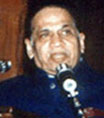
Vasant Sathe was born on 5th March, 1925. He had his early education in Bhonsale Military School, Nashik and at Nagpur Mahavidyalaya.
Mr. Sathe has been a good sportsman from his younger days. He learnt swimming and horse riding at the age of 6 and has been good at, Indian games as well as hockey, football and cricket. He was a captain of the boxing team of his college and Nagpur University. He has been a good debater and proficient speaker in Hindi, Marathi and English and has won many laurels in debating competitions during his college days. He was influenced from his childhood by his parents, who belonged to the Tilak School of thought. During his childhood, he has participated in the Prabhat Pheris of the Vanar Sena formed by Indira Gandhi in the Congress. He joined the Youth Congress in 1941 and actively participated in the Quit India Movement of 1942, removing the Union Jack and unfurling the Indian Tricolor of the District Court at Nagpur. Immediately thereafter, he faced a firing squad and police lathi-charge, got injured and was arrested. Having been influenced by the Socialist ideology through writings and speeches of Pt. Jawaharlal Nehru and other eminent leaders like Acharya Narendra Dev, Jay Prakash Narayan, Dr. Ram Manohar Lohia and others. He joined the Socialist Party from its inception in 1948.
Mr. Sathe has been a lawyer and an advocate from 1950 and has practiced both at the High Court and the Supreme Court. He became an active trade Union Leader since 1954 and was President of Madhya Pradesh Textile Workers Federation during 1956-1960 and the President of the Vidarbha Textile Workers Federation during 1960-65.
Mr. Sathe worked as an active Trade Union Leader for nearly 30 years. He rejoined the Congress along with a large section of the Socialist Party under the leadership of Chairman Mr. Ashok Mehta, in 1964. He represented India in the General Assembly of United Nations in the Silver Jubilee Session of 1970 and led the Indian Delegation in the Human Rights Committee.
Mr. Sathe was elected to Parliament in 1972 from Akola Constituency in the Vidarbha region of Maharashtra. He was reelected from the same constituency in 1977. From 1980 till 1991, he had been representing the Wardha Constituency in the Lok Sabha. He was Deputy leader of the Congress Parliamentary Party during 1977-79.
In January 1980 Mr. Sathe became the Union Minister of Information and Broadcasting in the Cabinet of Prime Minister Smt. Indira Gandhi. In his two-and-half years stewardship of this Ministry, Mr. Sathe was responsible for introducing colour television in India and also a network of Low Power Transmitters (LPTs) throughout the country, which today is responsible for reaching more than 80% of the nation's coverage.
Mr. Sathe then handled the portfolio of Chemicals and Fertilizers in the Cabinet of Prime Minister Smt. Indira Gandhi till 1984. During the Prime Ministership of Shri Rajiv Gandhi from 1985 till 1990, he held the portfolios of Ministry of Steel, Mines and Coal and the Ministry of Energy. He also held the additional charge of Ministry of Communication during 1987.
Mr. Sathe has always been interested from his childhood in classical arts of music and theatre. He was elected as Secretary for culture of the Constitution Club, which post he held for nearly 20 years. Because of his keen interest in cultural activities, Prime Minister Sh. P.V. Narasimha Rao, was pleased to appoint him as President of Indian Council for Cultural Relations, with Cabinet rank from February, 1993 to March, 1996.
Mr. Sathe had traveled widely in most of the countries in the world and had represented India in UNESCO, World Peace Congress, Indian Parliamentary Union and he was appointed as Chairman of the Indo-Japan Study Committee till May, 1996 and the Convener of the Quit India Movement Golden Jubilee Celebrations Committee-1992.
Mr. Sathe is the author of six books, his main interest being in economics and political restructuring. Apart from many other articles and papers he had written for Newspapers and periodicals, his well known books are-
- Towards Social Revolution- A case foe Economic Democracy- 1984
- Restructuring of Public Sector in India-1988
- The Challenge of Change- 1989
- Two swords in one Scabbard- 1989
- National Government- Agenda for New India-1991
- Tax without Tears- 1994
Chief Patrons
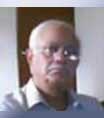
Mr. Anant Trivedi is a retired IT and engineering professional, member of the British Computer Society and a chartered engineer. Founder member of National Network For India, acting as their strategist. Also a founder member of VoteSmartIndia and Get Together For India.
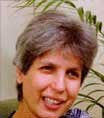
Anu Aga was born in Bombay, India on 3rd August 1942. She began her industry career in Thermax in 1985 and later was in charge of the Company's human resources function from 1991 to 1996. After her husband Rohinton Aga passed away, she took over as executive Chairperson of the Thermax Group in February 1996, and two years later became non-executive Chairperson.
As chairperson, Anu had facilitated four major turnaround initiatives at Thermax. Reconstitution of the board, shedding of non-core activities, rightsizing of operations and increased focus on the customer. She is also instrumental in driving a high performance culture at Thermax, especially at the senior levels. In October 2004, Anu decided to retire as the chairperson.
Anu has been very active in various national and local associations like Confederation of Indian Industries (CII) and had served as the Chairperson of CII's Western Region. She has written extensively and given talks on the subjects of women empowerment, corporate governance, value-based management and on corporate social responsibility.
She has done her BA in Economics and holds a post graduate degree in medical and psychiatric social work from Tata Institute of Social Sciences (TISS). She was selected for the Fullbright Scholarship for social workers to study for four months in the U.S. Anu is keenly involved in the causes of communal harmony and human rights, especially women and children.
She also supports various organizations that promote education, in particular of underprivileged children from slums. With the help of a Mumbai based NGO called Akanksha, 16 centres have been opened in Pune for the slum children. Currently she is involved with several NGOs.
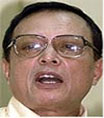
JAMES MICHAEL LYNGDOH, IAS (BH:1961) Born - Shillong - 08.02.1939 B.A. Hons. in Economics National Defence College Graduate.
- Parvin Fellow at Woodrow Wilson School of Public and International Affairs, Princeton University.
- Senior Executive Fellow, John F. Kennedy School of Government, Cambridge, Harvard University.
- Managing Director, Food Corporation of India, New Delhi.
- Additional Secretary, Ministry of Agriculture, Department of Agriculture and Cooperation, Government of India, New Delhi and Relief Commissioner, Government of India.
- Secretary, Department of Tourism, Ministry of Civil Aviation and Tourism, Government of India, New Delhi.
- Secretary (Coordination and Public Grievances), Cabinet Secretariat, New Delhi.
- President of the Indian Administrative Service Officers' Association.
- Superannuated in Government service in February, 1997
- Election Commissioner, Election Commission of India, New Delhi. (w.e.f. 1 March, 199 to 13 June, 2001 (FN)
- Chief Election Commissioner, Election Commission of India, New Delhi (w.e.f. 13 June, 2001 (FN) to 7 February, 2004 (AN)
Honors/Awards Received
- 2003 Ramon Magsaysay Award for Government Service
- 2003 Stars of Asia Awards for Policymakers, Business Week, Hong Kong
Publications
Election Laws and Criminalisation of Politics, Delhi Law Review, Vol. XIX Citaition for the 2003 Ramon Magsaysay Award for Government Service
In India, democracy took root despite extreme ethnic diversity and deep social cleavages. This remarkable success reflects the profound commitment of India's founders to elected government. It also reflects the wisdom of India's constitution, which in providing for elections also provides for a powerful nonpartisan commission to conduct them. It falls to the Election Commission of India to ensure that India's important federal and state elections are well organized, free, and fair. This is no small task given the subcontinent's 650 million voters and, these days, rising religious fundamentalism and raging communal hatreds. This immense and elaborate responsibility now rests on the shoulders of Chief Election Commissioner James Michael Lyngdoh.
Of Khasi tribal origin, Lyngdoh hails from the extreme northeastern corner of India. Imbibing moral rectitude from his father, a district judge, Lyngdoh completed his education in Delhi and entered the elite Indian Administrative Service when he was twenty-two. He quickly became known for probity and toughness and for, favoring the underdog against politicians and the local rich. In one early post, his principled execution of mandated land reforms so enraged landlords that he was transferred before the year was out. Similar clashes with the powers-that-be marked his rise in the Service. But rise he did, eventually serving as Secretary, Coordination and Public Grievances, Cabinet Secretariat, Government of India. In 1997, the president named Lyngdoh one of India's three election commissioners. By 2001 he was chief.
Lyngdoh soon faced crises in two of India's most troubled states. In Jammu-Kashmir, where India was locked in a potentially explosive standoff with Pakistan and local secessionists, state elections fell due in 2002. Many people doubted that they could be conducted credibly. Lyngdoh thought otherwise. Pushing ahead despite a vicious cross-border assassination campaign and a boycott, he updated and verified the election rolls, introduced voter identity cards, and added a thousand new voting sites. He recruited nonpartisan poll officers for every polling station. And after warning the army to stand clear, he heightened election security by mobilizing the local police and paramilitary forces from outside the state. Then he urged the people "to vote fearlessly." Forty-four percent did so. Even Lyngdoh's critics acknowledged that the polling had been fair, causing many in India to seize this triumph of "ballots over bullets" as a sign that the long-festering crisis of Jammu-Kashmir might yet be resolved peacefully.
Meanwhile, stirred by a terrorist attack in late February killing fifty-eight pilgrims, Hindus in Gujarat were slaughtering hundreds of the state's Muslims and torching their homes and neighborhoods. When the Hindu ruling Bharatiya Janata Party (BJP) dissolved the state government and called for elections amid the sectarian carnage, Lyngdoh used his authority to say no. Citing the large number of displaced persons and the pervasive atmosphere of fear in Gujarat, he postponed the elections. Although vilified for doing so, he stood his ground and carefully prepared for the delayed polls. He insisted, for example, that local officials and police who had been complicit in the anti-Muslim progrom be transferred, he outlawed campaign activities that inflamed communal passions; and he set up special polling places for Muslim refugees. In December, under tight security the people voted some 61 percent of them! Again, even skeptics agreed that the elections were fair and credible.
Lyngdoh: sixty-four, is a modest man known for his quiet ways and his transparent integrity. As a career civil servant, he has learned that it is best to avoid the limelight and the company of politicians. His impact lies elsewhere. As one admirer puts it, "He has always been a quiet fighter from within."
In electing James Michael Lyngdoh to receive the 2003 Ramon Magsaysay Award for Government Service, the board of trustees recognizes his convincing validation of free and fair elections as the foundation and best hope of secular democracy in strife-torn India.
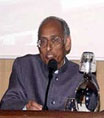
An eminent jurist, leading constitutional expert, distinguished parliamentarian, prominent citizen-intellectual, well-known human rights exponent, doyen of the Indian Bar and an author, poet, publicist, linguist and litterateur.
Positions held:
- 1962-67 Member, Third Lok Sabha Member, All Select Committees constituted by Parliament on Constitutional Matters
- 1964-67 Member, Government of India Committee on Information and Broadcasting Media known as Chanda Committee.
- 1972-73 Member, Government of India Committee on Legal Aid and Processual Justice
- 1973-75 Chairman, Rajasthan Law Reforms, Legal Services and Legal Aid Commission
- 1986 Chairman, Committee on Revitalization of Panchayati Raj Institutions, Government of India
- 1991-97 High Commissioner for India in U.K. (worked out a bilateral model for fighting terrorism and has shown how international criminal jurisprudence should be developed on a world wide basis); put Cultural and Economic Diplomacy in the forefront
- July 1998 Elected to Rajya Sabha
- 1999-2000 Appointed, Commissioner of Inquiry into Administration of Justice in Trinidad and Tobago
- June 2000 Elected President, Indira Gandhi National Centre for the Arts (I.G.N.C.A.) for ten years
- July 2000 Elected Member, Permanent Court of Arbitation at the Hague for six years
- Aug. 2000-01 Chairman, High Level Committee on Indian Diaspora (Rank of Union cabinet Minister)
- 2001 onwards Member, Committee on Home Affairs Member, Committee on External Affairs
- May 2002 onwards Member, Committee of Privileges
- SOCIAL AND CULTURAL ACTIVITIES, LITERARY, ARTISTIC AND SCIENTIFIC ACCOMPLISHMENTS
Awards:
- Inter- Faith Gold Medallion Award by the International Council of Christians and Jews, October, 1994
- U Thant Peace Award, 1995 by the Sri Chinmoy Peace Foundation
- Padma Bhushan, 1998;
Other Accomplishments:
- President of the World Parliament of Religions held at Chicago, 1993.
- Was invited to deliver the keynote address to the Centennial World Conference
- Elected in 1987 as Honorary Bencher and Master, The Middle Temple (U.K.), one of the highest honours in the gift of Judges and Lawyers in U.K
- Received world wide acclaim for his Report on the Independence of Justice and his Draft Universal Declaration on the Independence of Justice in the United Nations Human Rights Sub-Commission, August 1987.
- President, National School of Drama; Chairman, National School of Drama, 1978-82;
- Poet and author; presided over Jnanpith Creativity Festival of eminent litterateurs in Bombay, 1983
Books Published:
- "Freedom on Trial", Vikas Publishing House;
- Sandhya Ka Suraj (a collection of Hindi Poems),National Publishing House, New Delhi;
- Bharat Aur Hamara Samay (compendium of essays on contemporary India), Nataraj Prakashans, New Delhi,
- "A Tale of Three Cities", Cambridge University Press, 1996;
- "Jurisprudence of Non-Violence and Peace", Leicester University;
- "Democracy and Rule of Law", 2002;
- "Towards Global Togetherness", 2002;
- "Jain Temples in India and around the World," 2002 and "A Diplomatic Sojourn", 2002
- Co-author and editor of 175 books, monographs and research papers on diverse subjects; writes poetry and literary essays also.
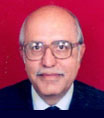
Promod Chawla, Trustee NNFI, 68, from an International Marketing & Corporate planning Industry background - whole time, social networker, for 7 years, firmly believing alongside stalwarts, in Group Action. Recognising that future of India will be determined with quality of Councilors, MLA's, MP's. Herein, Political Leadership allowed inroads by Criminal elements as Partners. 15th Lok Sabha has a distinct increase in Criminals over 14th ended in May 09. Earlier 128, now 152.
Law Breakers as Law Makers are unacceptable to GenNext also Women, Elders, Election Watch NGO's,Civil Society,conscious NRI Groups now in instant contact through Internet & Satellite technology. Each seeing that our collective future lies vulnerable due greed & nesting of wealth in foreign accounts whilst India must bring back our peoples resource - use it for development. Come up with practical amnesty schemes which avoided mention of in latest budget though a topic of forefront discussion in concerned Think Tanks.
Through Social Audits, RTI, Transparency, use of eGov & Civil Society holding our State to Account lie many of our Solutions. The Naxal problem + disparity across India are directly related to hoarding by Political Masters, also insecure businessmen who recognise that within Corrupted Governance uncertainties must to be factored. This is all to the advantage of Govt's of Tax Havens.
NNFI - links like minded, facilitating good Governance Subodh Bhargava, Promod Chawla, Jai Kumar, Samuel Paul, Gen.Vinod Saighal, Roshan Seth, Tara Sinha, R K Somany are NNFI Trustees. Strategist: Anant Trivedi & Parmjit Jutla (based in EU) Economist: Prof Arun Kumar

Taruvai Subayya Krishnamurthy (born 1941) was the Chief Election Commissioner (CEC) of India (February 2004-May 2005)[1]. His main assignment as CEC was to oversee the 2004 elections to the Lok Sabha. He was known for his integrity and the polite yet firm fist with which he handled all sensitive assignments through his career.
He had earlier served in the Election Commission of India as a commissioner since January 2000.
Background
Krishnamurthy started his career as an Indian Revenue Service officer. He served the government at various levels including as Secretary, Department of Company Affairs. He was the first Indian Revenue Service officer to become Secretary to the Government of India as well as Chief Election Commissioner of India.
Krishnamurthy started his career as a probationary officer of the Bank of India (prior to nationalization) at the age of 19. He joined the Indian Revenue Service in the batch of 1963 subesequent to which he was posted as Income Tax Officer in Madras. Having served number of ministries in New Delhi including Shipping and Finance, he was deputed as a Deputy General Manager with the Hindustan Shipyard Limited in Vizag. One of the key jobs he has handled was that of Chief Commissioner of Income Tax in Bombay.
He also served as an IMF advisor in Ethiopia and Georgia. As Chief Election Commissioner he was an observer to the elections in Zimbabwe and the US Presidential Elections in 2004. In 2005 Krishnamurthy was appointed by the Supreme Court of India to conduct the elections to the Board of Control for Cricket in India(BCCI) in order to ensure free and fair polls amidst the different factions within the BCCI.
Krishnamurthy won gold medals in History, Economics and Political Science at Mysore University. He also completed a Masters in Fiscal Studies from the University of Bath, U.K
Krishnamurthy is married to Geetha Krishnamurthy, an accomplished veena artiste from Chennai. He is the author of the book "Miracles of Democracy", published in August 2008.

